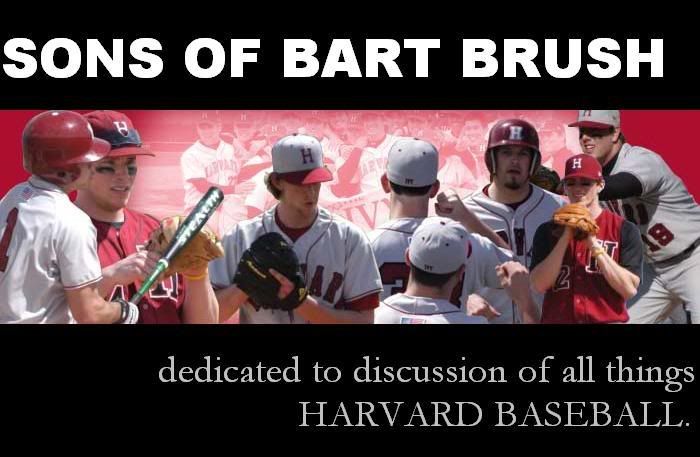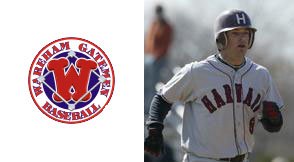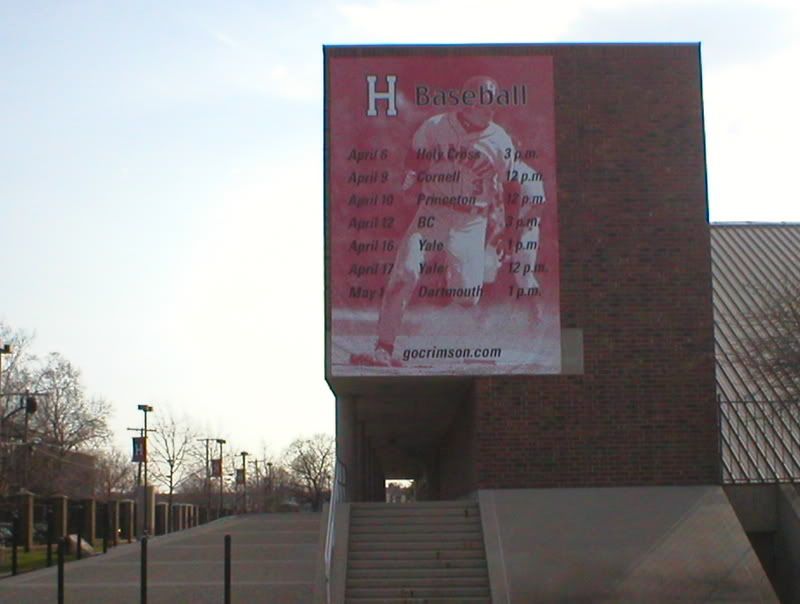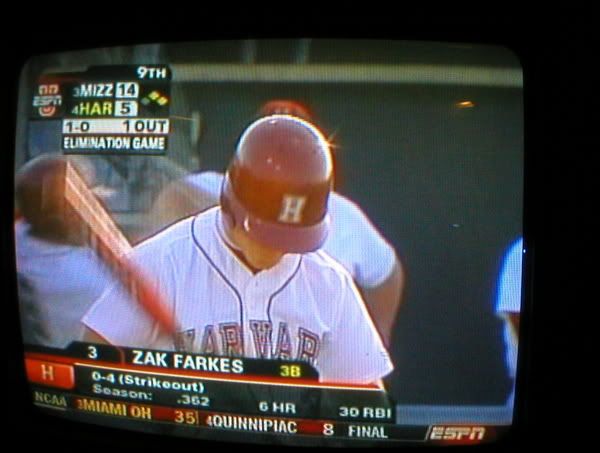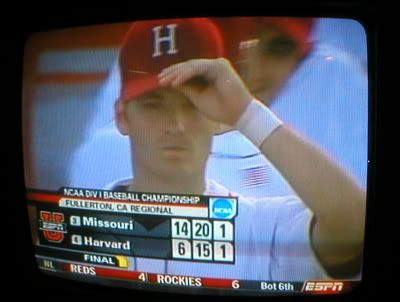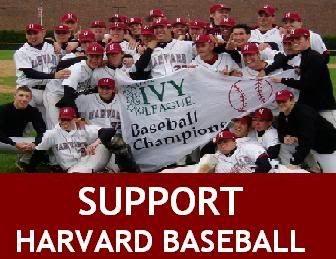So we've got something new for you today.
We recently gathered several alums from the championship teams of the late 90s for an e-mail roundtable in anticipation of the NCAAs and because even Faiz and I run out of things to post during lulls like this. Their availability over e-mail is limited because they all have regular jobs, and a couple of them face
particularly busy weeks.Still, many were able to time to respond, and we'd like to thank Andrew Duffell, David Forst, Mike Marcucci, Brian Ralph, Peter Woodfork and, of course, Bart Brush, for agreeing to participate in a feature we hope will continue.
SoBB: At this time of year, it makes sense to think back to your era's Harvard teams as the ones that were the most successful in the modern history of the program, both in the league and with some impressive showings in the NCAA postseason. What stands out about those teams the most in your memories?Mike Marcucci: Some thoughts while thinking I could probably shut down the A's for at least a couple innings right now.
* Saving the specific anecdotes for later, I'll make two comments I think one of the biggest things that stands out about those teams is the difference between perception and reality. The perception of the teams, I think, was that they combined deep, quality pitching and good defense with a scrappy offense that scrounged out runs through nifty baserunning and intentional out-making. The first two parts are true. In particular, I was a regular beneficiary of having Forst, Hal, and Woody in the infield. What I think is underrated most about those teams is how good the offense was. We had solid hitters one through nine, guys who worked the count and could hit for power. The power tended toward doubles and long foul balls in New Hampshire but, when needed, we could mash. In that way, this year's team seems to resemble those older squads. In the NCAA, you have to be able to swing the stick because, eventually, everyone runs out of pitching. And, the top teams are so good on defense in many cases that some of the aggressive baserunning we employed to great effect in the league and in the northeast, was neutralized to a certain extent. The other problem, of course, is that small ball helps you score a couple of runs, but you need more than that in the tourney. Take Forst (please!), for example. People usually focus on how good he was on defense and how much time he spent in the training room, but what lots of people forget is that by mid-way through the 1997 season, he was an on-base and doubles machine (sound familiar?) and had successfully moved up from the 11 hole to #9. We were successful because we could win pitchers' duels and slugfests.
* Second was the obvious-- the top teams that be played and beat. When Coach Walsh came in, he came with the attitude that we would play anybody, anywhere and our goal as a team as not just to win the Ivy League, but to be the top team in New England and competitive on a national level. He went out and scheduled the big boys and it paid off, both in post-season success but also success in the Ivy League. We fed off of that attitude and the results speak for themselves. Of course, it also helped that there were two great recruiting classes in a row, and the talent was there to match that attitude. Otherwise, the attitude would just have been annoying.
Bart Brush: Cooch is correct. The 1997 team especially could really swing it by the end of the year.
I also always love to see that 18-2 Ivy record.
On a less serious note, not sure if you guys remember this but I know Ralph was there with me. Do you remember shagging BP one day after we had won the Ivies in 1997 and trying to determine MLB trade-style how we could get one more bat for the NCAAs. I think we were ultimately decided to dangle me (capitalizing on the fact that I had begun to pitch better after an awful start that season), Cooch (always reliable in the pen) and Woodfork (Woody was just coming around after being hurt on and off throughout that year) for Cornell SS Bill Walkenbach with the intention that he would play 3rd base and hit 5th for us in Stillwater.
On yet another different note, if Fullerton elects to save Romero (high
draft pick and ace lefty) on Friday, it would be eerily similar to UCLA
holding back
Jimmy Parque (high draft pick and ace lefty) against us back in 1997.
Andrew Duffell: I remember that day... although I believe we also considered shipping Kessler to the Big Red as well, as we didn't think they would bite for pitchers alone (Kalyvas was also in the mix). Harris volunteered himself, uttering something not fit to print about the Cornell females, but we didn't think adding self-nicknamed "Slash" to the equation would sweeten the deal.
Sidenote: Randomly, a friend of an ex-girlfriend of mine married Walkenbach, and I met him a few years back. I told him about the proposed trade and he said he gladly would've packed his bags and headed to Cambridge. I then told him he would've needed to lose the rec specs first, as he looked like a dork on the field.
Dave Forst: (We're starting our draft meetings today, so I'll try to get in some comments between deciding whether Farkes is a 2nd or 3rd rounder.)
Thanks for starting us off Cooch. I appreciate the kind comments, but my recollections of the 97 team are more of Hogan at Miami, Quinn at Cornell, Cooch vs. Princeton, and Ralph vs. everyone. I think we pitched our way to 34-16, and once that ran out in Stillwater, we got exposed. I seem to remember Ralph's bat carrying us most weekends, with a dose of Hal, Albers, and streaking Kessler mixed in. We went out every weekend thinking we should we win 4 games because our pitchers were going to keep us in the game, and Ralph was going to come up with a big hit at some point (after which, he was probably going to get picked off trying to do too much on the bases).
Bart, I do remember the conversation regarding trading for Walkenbach, mostly because I was flattered that you guys had agreed to move him to 3rd base for me. I thought I might miss Woody's sunny disposition and constant optimism, but I was willing to risk that for a chance at Omaha.
I had the same thought about Fullerton possibly holding out Romero Friday night as an analogy to Parque in '97. (For what it's worth, Kotsay has a call in to the Fullerton coach to see what they're going to do, and then he'll decide how many runs to give me in our gentleman's bet.) The 4 team format makes it a different decision, plus they have 2 other starters who are pretty freaking good.
"Think double," "go for the jugulah," and "stocker's rights" will never cease to be funny reminders of those teams.
Brian Ralph: Cooch, excellent points as usual. We did have solid, deep pitching (even after some injuries to key parts) and the defense was great not good. If I remember we not only finished 6th in the country, but that was on fields not as good as in the Sun Belt. Plus, we regularly mixed in spectacular plays in addition to making the easy ones.
The '97 team had better pitching and defense. Add Albers and Hogan and a Forst that only made like 5 errors (3 in game against Army, I believe). We should have been 20-0 in the Ivy if not for the Princeton collapse which would have been pretty incredible. I think the 18-2 is still the best ever in Ivy play.
[Editor's Note: It is.]And I also remember most of those games were not close, lots of 5-1, 6-3, 7-2 scores. And with 1 more SP, Omaha was a real shot (no offense to Bart but I would have loved to have had the 96 Quinn or 97 Jamieson go the first 5) and Hogan against UCLA again. Although that offense was not as good 1-9, scoring 7, 6, 7, and 11 runs in 4 regional games is impressive. That team hit homers, hit 'n run, stole bases, worked counts (remember Jacquez throwing like 60 pitches in the first 2 innings), but didn't hit quite as well as '98.
Giving up pitching (unless it was a Kalyvas/Vail deal) wouldn't have helped win a regional. You need every last decent arm in a 6 teamer.
'98 whacked the ball around against anyone. I think we only lost 1 game to Dartmouth at the end after the 1st weekend series and won every midweek game. Although we lost Albers (and Wilke), Forst was way way better, Kess, Huling, and Keck were way better. We definitely did not just play smallball and we did draw a lot of walks (Forst and Hal the exceptions). With the exception of the Fullerton debacle, 6, 14, and 7 runs again for an avg of 7 runs in 4 reg games. Hard to beat. No pitching other than Cooch, Vail, Birtwell, and Donny.
As for Farkes, where was Moneyball and OBP when I needed it? If I hear another Damon Buford story from Walsh... Is charles thomas still hitting .100? Hitting .330 in the second half of the FSL with a million walks got me a nice warm seat behind the infamous Darrell Dent. You have to retire when a team goes with Darrell Dent over you. No surprise that staff is all out of the game.
[And] speaking of Harris, how about his exit from the program? Remember the dive into first base as a pinch runner getting picked off and the hurt shoulder that led him to the links? We should have packaged him in a prospects deal.
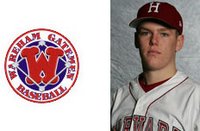 We continue our chat with John Wylde, President and GM of the Wareham Gatemen of the Cape Cod League.
We continue our chat with John Wylde, President and GM of the Wareham Gatemen of the Cape Cod League.